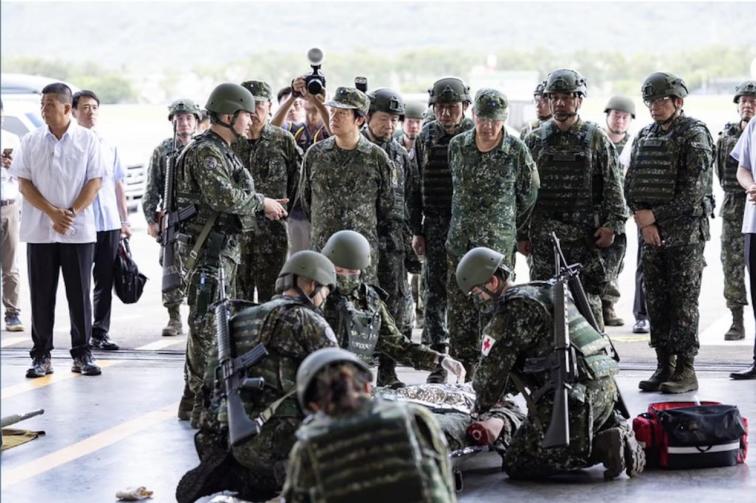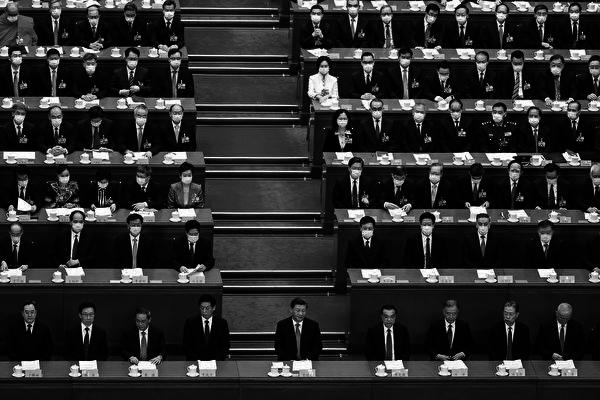Dark clouds hang over Tiananmen Square in Beijing. (Lintao Zhang/Getty Images)
[People News] The much-anticipated Fourth Plenary Session of the Chinese Communist Party (CCP) appears to be indefinitely delayed. While the CCP has yet to release any official announcement about the meeting’s schedule, a series of recent high-level personnel changes suggest unusual political turbulence. Du Wen, a former deputy director at the Legal Advisory Office of Inner Mongolia’s Legislative Affairs Office and now in exile in Europe, believes the top CCP elites have yet to reach a consensus on personnel changes. In a political culture that strongly emphasizes unity and avoids exposing internal divisions, the meeting is repeatedly postponed.
The Fourth Plenary Session, originally expected to be held before the end of October last year and before the Central Commission for Discipline Inspection (CCDI) plenary session, remains unheard of. What exactly is happening inside Zhongnanhai remains shrouded in mystery, and the opaque nature of CCP politics only adds to the sense of unease.
Recently, there have been massive personnel changes within the CCP, some of which are described as “unprecedented.”
In early April, current Central Organization Department head Li Ganjie and current United Front Work Department head Shi Taifeng swapped roles. Shi Taifeng became head of the Organization Department, while Li Ganjie took over the United Front portfolio. This unusual switch between top positions raised questions and speculation, especially since the reasons remain unclear.
On June 27, the 16th meeting of the Standing Committee of the 14th National People's Congress concluded, announcing the removal of several individuals from their posts, including Jin Xiangjun, Lan Tianli, and Liu Jiachen. Notably, Miao Hua—former director of the PLA General Political Department and a close ally of Xi Jinping—was removed from his role as a member of the Central Military Commission.
Miao, who turns 70 this year, served for many years in Xi’s trusted 31st Group Army under the former Nanjing Military Region. His downfall is widely interpreted as a sign of Xi’s declining control over the military.
On June 30, after a 65-day gap, the CCP Politburo finally convened a meeting. As per tradition, the Xinhua News Agency concluded its report by stating, “The meeting also discussed other matters.” The next day, one of these “other matters” was revealed: Ma Xingrui was relieved from his posts as Party Secretary, Standing Committee member, and member of the Xinjiang Uyghur Autonomous Region Party Committee. Chen Xiaojian was appointed as his replacement.
However, there was still no mention of the missing Central Military Commission Vice Chairman and Politburo member He Weidong. He has been absent from major meetings and events where his presence was expected. While authorities have remained tight-lipped, rumours abound that he has been placed under investigation—or even that he is dead. Both The Washington Times and the Financial Times previously reported that He Weidong may be under investigation.
In recent months, a series of unusual changes have occurred within the upper echelons of the Chinese Communist Party (CCP) and the Politburo, sparking external doubts and discussions about the stability of Xi Jinping's grip on power.
In his YouTube program Inside Perspective on China, Du Wen analysed that the foremost issue is the abnormal functioning of the CCP Central Politburo.
Typically, the Politburo holds monthly meetings as part of its top-level decision-making process. However, there was a rare two-month gap without any publicly reported Politburo meeting this spring. The sudden session on June 30 focused on a single agenda item: reviewing the “Work Regulations of the Central Committee’s Decision-Making and Coordination Mechanisms.”
Du Wen believes this meeting was highly unusual. On one hand, the agenda was narrowly focused on a foundational issue, possibly to obscure the real topic of discussion. On the other hand, the same afternoon saw the Politburo hold a collective study session, suggesting an urgent situation requiring rapid action and signalling internal tensions at the highest level.
At the same time, the mysterious disappearances of certain high-level officials have further fueled speculation about instability within Zhongnanhai. The most notable case is that of He Weidong, Vice Chairman of the Central Military Commission and a member of the Politburo.
After attending the Two Sessions in March, He Weidong vanished from public view. According to Du Wen, sources informed him that He had traveled to Xinjiang and, after overseeing a military exercise simulating an attack on Taiwan at a command base there, mysteriously disappeared without any further information.
In late March, when the Chinese Ministry of Defence was asked whether He Weidong was under investigation, the spokesperson simply responded that they were unaware of the situation. Du Wen pointed out that this response starkly contrasts with the CCP’s usual practice of firmly denying false reports, suggesting something unusual is indeed going on.
Du Wen suggests that all signs point to He already being internally detained, with a formal announcement only pending the right timing. His disappearance creates a vacuum in the Politburo’s military representation.
The sudden reassignment of Organization Department head Li Ganjie to the United Front Work Department—a post seen as less central—has sparked a variety of theories. Li’s political background is most closely tied to Tsinghua University and Shandong Province, suggesting that issues related to his university network or past political career may be involved.
Du Wen believes any disciplinary actions against Li Ganjie may be formally addressed during the delayed Fourth Plenum, implying that the leadership has yet to agree on how to handle his case. Shi Taifeng, while seemingly promoted, is likely tasked with balancing internal party factions and acting as a buffer between Xi Jinping and the Party elders.
Ma Xingrui, recently removed from his leadership role in Xinjiang, is another noteworthy case. Ma has a background in aerospace and economic affairs and was handpicked by Xi for several high-profile roles, including Shenzhen Party Secretary and Governor of Guangdong Province. According to Du Wen, Ma’s sudden reassignment suggests deeper strategic considerations.
Ma’s military-industrial background is extensive. He once led China’s National Space Administration and served as chief commander of China’s next-generation carrier rocket program. Given this background, Du Wen speculates that Ma could be a potential replacement for He Weidong.
This wave of personnel changes sends a clear message: even high-level Politburo members can be swiftly reassigned or removed.
The Politburo, typically regarded as a relatively stable leadership body during its term, has seen extraordinary turnover less than three years into its current cycle.
According to Du Wen, over 10 members of the Politburo and Central Committee have already been replaced or reassigned—more than one-eighth of the body—an unprecedented figure in recent decades of CCP history.
Du Wen notes that large-scale personnel reshuffles are usually tied to Party Congress sessions. Mid-term adjustments of this scale suggest serious internal problems. One direct consequence of this political earthquake is the indefinite delay of the Fourth Plenary Session.
To date, no date has been set for the Fourth Plenum. What is really going on behind the scenes?
Du Wen argues that the most likely explanation is the lack of consensus among the Party’s top ranks. CCP meetings, especially plenums, are carefully orchestrated to project unity and consensus. If major disagreements or conflicts exist, the Party tends to postpone or delay such meetings until unity is re-established.
Du Wen concludes that each major personnel change reflects deep instability and hidden tensions within the CCP. The delayed Fourth Plenum underscores Xi Jinping’s growing challenges and declining authority within the Party.
Looking back, the 19th Party Central Committee’s Fourth Plenary Session was also delayed nearly a year. At the time, analysts interpreted the delay as evidence that Xi struggled to build consensus within the Party—foreshadowing growing opposition that could eventually challenge his supremacy.
(Originally published by People News)











News magazine bootstrap themes!
I like this themes, fast loading and look profesional
Thank you Carlos!
You're welcome!
Please support me with give positive rating!
Yes Sure!